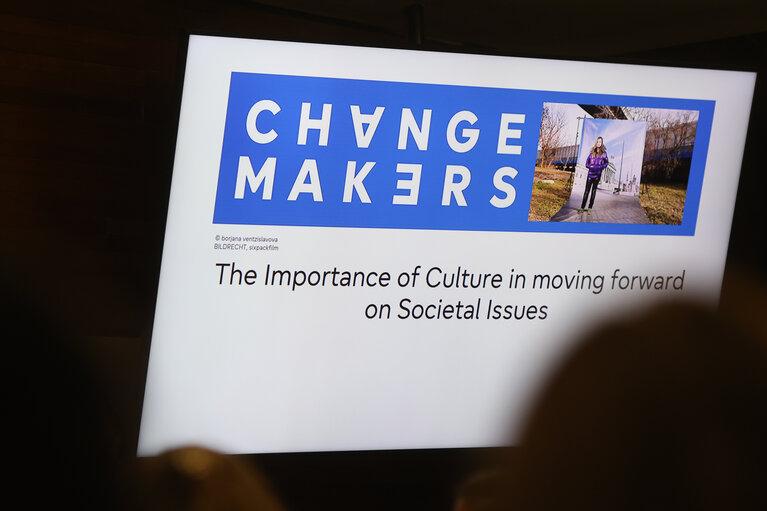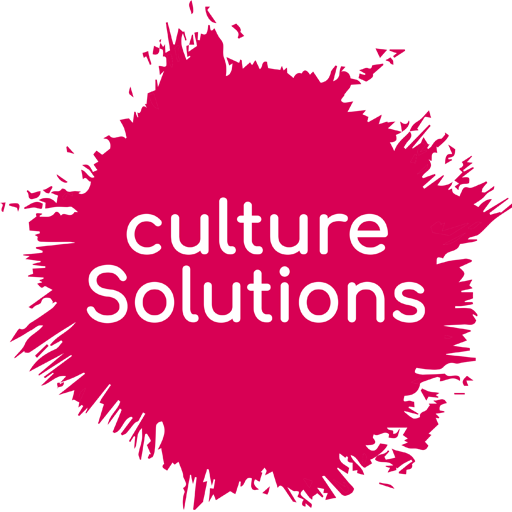Changemakers – EU commited to defending democracy and culture worldwide

By Elise Cuny
On 12 March 2025, the art exhibition “Changemakers – from committed art to democratic artivism” was inaugurated in the European Parliament in Strasbourg by the Cultural Outreach Unit (EP DG COMM). The opening was hosted by MEP Myriam Lexmann, Chair of the Artistic Committee (the EP body in charge of purchase and donation of works of art and Parliament’s art collection).
Elise Cuny represented culture Solutions along with other prominent European cultural organisations and networks leading the way in the engagement of culture for free expression and protection of democracy (European Cultural Foundation, Culture Action Europe, Europa Nostra, the Network of European Museum Organisations, Encatc, EUNIC, European Network of Cultural Centres, IETM, ELIA, and Michael Culture Association).
The event was the occasion to engage with MEPs such as Nela Riehl, Chair of the CULT committee, on the role and strength of art in addressing societal issues, and with Lina GALVEZ, Chair of the FEMM committee, on the role of women as keepers of cultural heritage.
Elise Cuny shared insights from research conducted by culture Solutions as part of our mission to monitor and inform on culture in the EU’s external action and to represent voices of cultural professionals. With her interventions, she called for:
- Recognition and support for women-led NGOs working on cultural heritage transmission and youth engagement across the Mediterranean, ensuring their vital contributions are integrated into the New Pact for the Mediterranean.
- Impact assessment of the positive societal contributions of civil society organisations collaborating with schools, in fostering youth engagement, social cohesion and intercultural dialogue, combating hatred and addressing the harmful effects of social media—such as misinformation, manipulation, and social isolation.
- Innovative programmes bridging culture, democracy, skills and youth employment funded through Erasmus+ and Horizon Europe and backed by the Team Europe Democracy Initiative to equip African and European youth jointly with digital skills capable of defending democracies and equip youth to fight disinformation and express their views freely.
- Enhanced and visible European cultural cooperation that is crucially relevant for democracy and support to cultural actors and civil societies worldwide.
You can find the full text of her interventions below.
Role of women as keepers of cultural heritage
“The past years, I have witnessed the work of women engaged in cultural heritage’s preservation but also transmission. Transmission requires tenacity, positivism and a sort of idealism – a term that is not well seen these days. Those are qualities that I’ve found in all women I have engaged with, transmitting heritage and through it, values.
The Odyssée programme, founded by Lara-Scarlett Gervais, engages with more than 6000 primary and secondary schools students worldwide (in Europe, North Africa and the Middle East especially) to understand what is cultural heritage, to connect with their local cultural heritage and to share it with youth from other places.
La Maison de la Philosophie in Casablanca, Morocco, founded by Housni Zbaghdi accompanies children in primary and secondary schools to observe their surrounding environment, interacting with their cultural heritage, tangible and intangible by tapping into the learning of philosophy made accessible to them. The programme has trained more than 250 professors from public and private schools.
With this intervention, I want to highlight the tenacious work of women that do a lot, hand in hand with teachers, to support quality education and societal harmony, a work that often goes very quiet. We should do better in enhancing these efforts and measure the positive societal impact it has on youth – in a time where we all suffer from social media saturation and manipulation.”
Strength of art for societal issues: Ethics and political freedom, democracy and voting
“My intervention will focus on how to support youth in ensuring political freedom. I am happy to share some insights of a research project that is in its finalisation phase and that we conducted in partnership with the South African Cultural Observatory and funded by the Africa-Europe Foundation.
The research looks at skills in the cultural, creative and media sectors that are relevant for youth employment in sub-Saharan Africa.
Too often, culture and media are manipulated both by illiberal national governments and foreign influences working against human rights, and African youth is not spared by that. We see media coverage changing in the Sahel with the rise of Russian influence, and we see China investing in media training institutes all over Africa with a clear objective to promote a positive coverage of Chinese actions.
At the same time, youth globally is losing sight and understanding of what democratic regimes bring them. The Open Society Foundation 2023 barometer indicated that only 57% of 18 to 35 year-olds globally think democracy is preferable to any other form of government. On the other hand, African youth has shown distrust in corrupt regimes (the 2024 African Youth Survey released by the Ichikowitz Foundation reveals that corruption is cited as the most pertinent concern for youth across Africa), and disappointment in voting as sole guarantee of democratic regime.
To counter this worrying trend globally, it is important to invest more in youth knowledge of human rights and genuine democratic practices. Young people need to be equipped with skills allowing them to experiment and be aware of the tangible benefits of democratic regimes between elections. African civil societies have got to grips with the challenge of building a homegrown democratic model and transmitting the skills that will defend that model. The Fondation de l’innovation pour la démocratie based in South Africa and supported by France in its creation, has for instance launched a new programme of digital skills for media and journalism that will be essential in countering disinformation. But more can and should be done to equip African and European youth.
With this intervention, I want to stress the need for new ambitious programmes bridging culture, democracy, skills and youth employment in the field of cultural and creative industries as part of the international education (Erasmus+) and research (Horizon Europe) fundings of the EU and as part of the Team Europe Democracy Initiative. I also call for an enhanced and visible European cultural cooperation relevant for democracy and support to cultural actors and civil societies worldwide.”
The views expressed in this article are personal and are not the official position of culture Solutions as an organisation.
Photo credits: European Parliament, 2025
